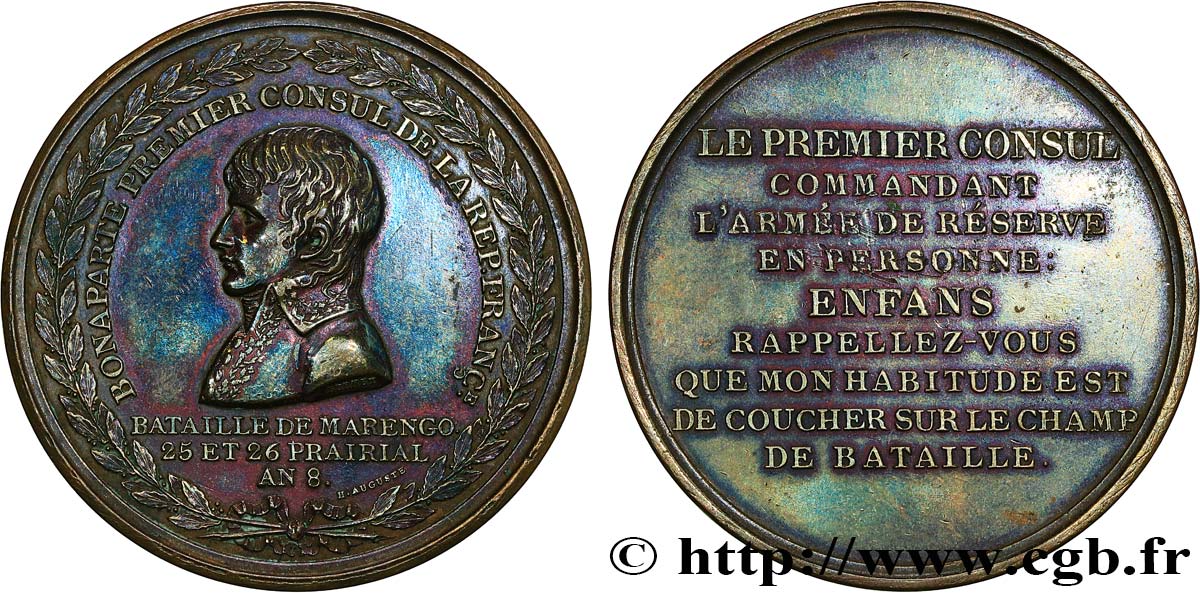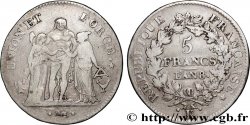fme_674596 - FRANZOSISCHES KONSULAT Médaille, Bataille de Marengo
Nicht verfügbar.
Artikel auf unserem Online-Shop verkauft (2025)
Preis : 200.00 €
Artikel auf unserem Online-Shop verkauft (2025)
Preis : 200.00 €
Type : Médaille, Bataille de Marengo
Datum: 1800
Name der Münzstätte / Stadt : Italie, Marengo
Metall : Bronze
Durchmesser : 49,5 mm
Stempelstellung : 12 h.
Graveur BRENET Nicolas-Guy-Antoine (1773-1846)
Gewicht : 63,62 g.
Rand lisse
Punze : sans poinçon
Kommentare zum Erhaltungszustand:
Exemplaire anciennement nettoyé présentant quelques coups et rayures. Patine hétérogène et sombre à l’avers
Vorderseite
Titulatur der Vorderseite BONAPARTE PREMIER CONSUL DE LA RÉP. FRANCE // BATAILLE DE MARENGO / 25 ET 26 PRAIRIAL / AN 8..
Beschreibung Vorderseite Buste habillé à gauche de Napoléon, tête nue, entouré d’une couronne de laurier. Signé sur le tranché du bras : BRENET et D’AOUSTE prés de la couronne de laurier.
Rückseite
Titulatur der Rückseite LE PREMIER CONSUL / COMMANDANT / L’ARMÉE DE RÉSERVE / EN PERSONNE : / ENFANS / RAPPELEZ-VOUS / QUE MON HABITUDE EST / DE COUCHER SUR LE CHAMP / DE BATAILLE..
Beschreibung Rückseite Légende en neuf lignes horizontales.
Kommentare
La bataille de Marengo (14 juin 1800), vit s'opposer une force française commandée par le général Napoléon Bonaparte, alors Premier consul, à l'armée impériale du Saint-Empire sous la direction du feld-maréchal baron Michael Friedrich Benedikt von Melas à Alexandrie, dans le Piémont, en Italie.
Les Impériaux tentent de profiter de l'allongement des lignes françaises, occupées à rechercher leur adversaire après la bataille de Montebello, pour traverser l'armée française. Les troupes des généraux Victor et Jean Lannes, obligées de faire retraite devant le gros de l'armée de Melas qui les attaque par surprise, sont soutenues en milieu de journée par les troupes que Bonaparte mène à leur secours. En fin de journée, l'arrivée des cavaliers du général Desaix permet aux Français, fort mal en point, de faire basculer l'issue de la bataille en leur faveur, au point de transformer leur retraite en déroute des Impériaux.
Après la défaite, les Impériaux négocient avec le général Bonaparte la fin de la guerre en Italie qui oblige notamment les troupes impériales à se replier au-delà du Tessin.
Ce fait d'armes permit à Napoléon d'asseoir un peu plus sa position au sein du triumvirat consulaire en tant que Premier consul après son coup d'État, au mois de novembre précédent. Malgré la mort de Desaix, la victoire est décisive pour la campagne d'Italie, et permet à Bonaparte de monter une opération de propagande fort importante, faisant passer la bataille à la postérité..
The Battle of Marengo (14 June 1800) saw a French force commanded by General Napoleon Bonaparte, then First Consul, pitted against the Imperial Army of the Holy Roman Empire under Field Marshal Baron Michael Friedrich Benedikt von Melas in Alexandria, Piedmont, Italy..
The Imperials tried to take advantage of the lengthening of the French lines, busy searching for their adversary after the Battle of Montebello, to cross the French army.. The troops of Generals Victor and Jean Lannes, forced to retreat before the bulk of Melas's army which attacked them by surprise, were supported in the middle of the day by the troops that Bonaparte led to their aid.. At the end of the day, the arrival of General Desaix's cavalry allowed the French, who were in very poor shape, to turn the outcome of the battle in their favor, to the point of transforming their retreat into a rout of the Imperials..
After the defeat, the Imperials negotiated with General Bonaparte the end of the war in Italy, which notably forced the imperial troops to withdraw beyond the Ticino..
This feat of arms allowed Napoleon to further consolidate his position within the consular triumvirate as First Consul after his coup d'état the previous November.. Despite the death of Desaix, the victory was decisive for the Italian campaign, and allowed Bonaparte to mount a very important propaganda operation, making the battle go down in history..
Les Impériaux tentent de profiter de l'allongement des lignes françaises, occupées à rechercher leur adversaire après la bataille de Montebello, pour traverser l'armée française. Les troupes des généraux Victor et Jean Lannes, obligées de faire retraite devant le gros de l'armée de Melas qui les attaque par surprise, sont soutenues en milieu de journée par les troupes que Bonaparte mène à leur secours. En fin de journée, l'arrivée des cavaliers du général Desaix permet aux Français, fort mal en point, de faire basculer l'issue de la bataille en leur faveur, au point de transformer leur retraite en déroute des Impériaux.
Après la défaite, les Impériaux négocient avec le général Bonaparte la fin de la guerre en Italie qui oblige notamment les troupes impériales à se replier au-delà du Tessin.
Ce fait d'armes permit à Napoléon d'asseoir un peu plus sa position au sein du triumvirat consulaire en tant que Premier consul après son coup d'État, au mois de novembre précédent. Malgré la mort de Desaix, la victoire est décisive pour la campagne d'Italie, et permet à Bonaparte de monter une opération de propagande fort importante, faisant passer la bataille à la postérité..
The Battle of Marengo (14 June 1800) saw a French force commanded by General Napoleon Bonaparte, then First Consul, pitted against the Imperial Army of the Holy Roman Empire under Field Marshal Baron Michael Friedrich Benedikt von Melas in Alexandria, Piedmont, Italy..
The Imperials tried to take advantage of the lengthening of the French lines, busy searching for their adversary after the Battle of Montebello, to cross the French army.. The troops of Generals Victor and Jean Lannes, forced to retreat before the bulk of Melas's army which attacked them by surprise, were supported in the middle of the day by the troops that Bonaparte led to their aid.. At the end of the day, the arrival of General Desaix's cavalry allowed the French, who were in very poor shape, to turn the outcome of the battle in their favor, to the point of transforming their retreat into a rout of the Imperials..
After the defeat, the Imperials negotiated with General Bonaparte the end of the war in Italy, which notably forced the imperial troops to withdraw beyond the Ticino..
This feat of arms allowed Napoleon to further consolidate his position within the consular triumvirate as First Consul after his coup d'état the previous November.. Despite the death of Desaix, the victory was decisive for the Italian campaign, and allowed Bonaparte to mount a very important propaganda operation, making the battle go down in history..








 Berichten über einen Fehler
Berichten über einen Fehler Die Seite drucken
Die Seite drucken Teilen meiner Auswahl
Teilen meiner Auswahl Stellen Sie eine Frage
Stellen Sie eine Frage Einlieferung/Verkauf
Einlieferung/Verkauf
 Details
Details










